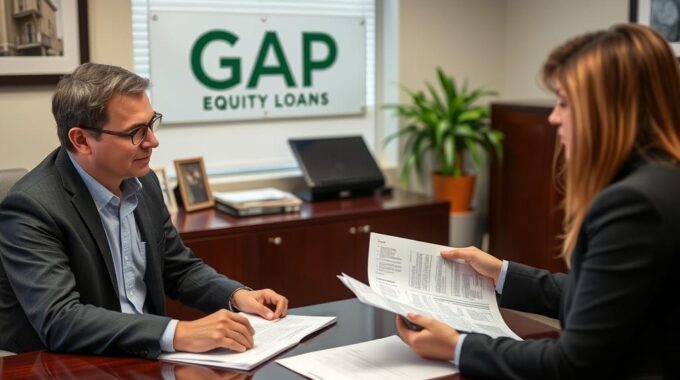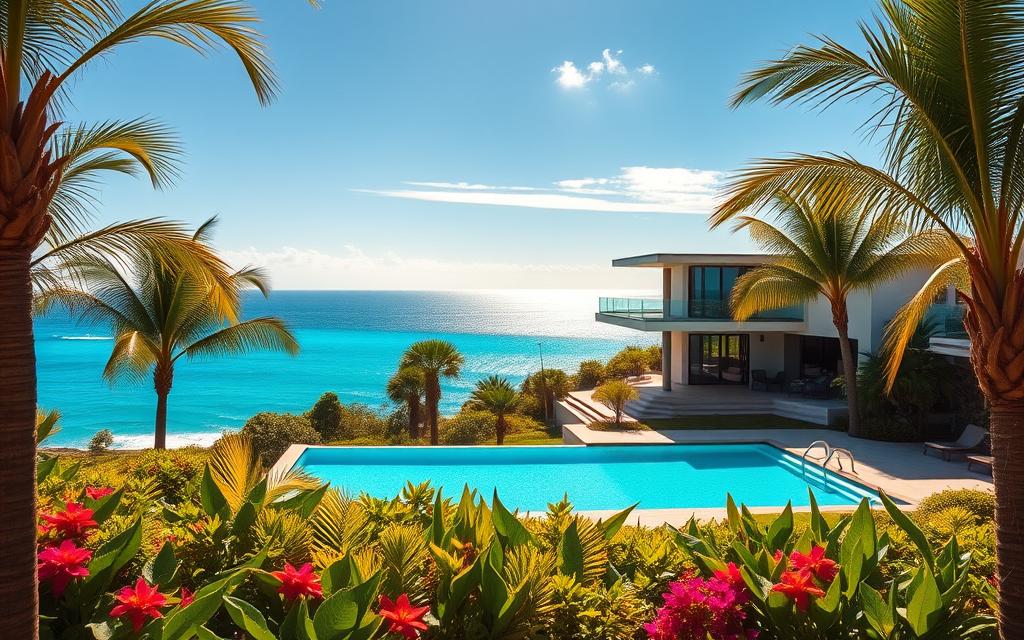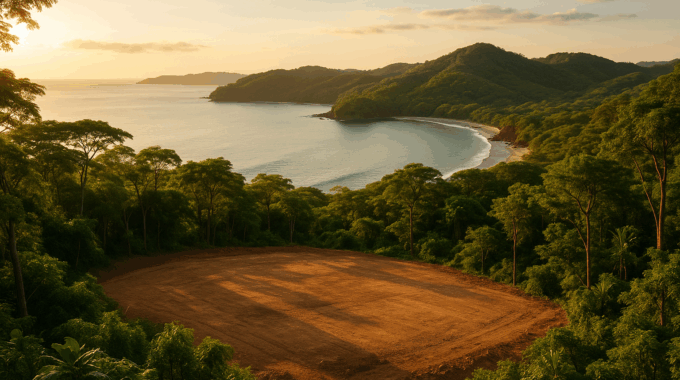Costa Rica, with its lush landscapes and booming real estate market, is a land of…

Costa Rica Real Estate Investment Loans FAQ With Gap
Did you know that nearly 20% of Costa Rica’s properties are owned by foreigners, yet they often face significant hurdles in securing financing through traditional banking channels?
Buying property in Costa Rica can be a thrilling venture, but the financing process can be daunting, especially for foreign investors. Traditional financing options often require a substantial down payment, ranging from 35-50%, and come with interest rates between 7-10% for U.S. dollar loans.
At GAP Equity Loans, we simplify the process by connecting borrowers with private investors and lenders, offering competitive rates and flexible financing options. Our equity loan approval process is designed to be straightforward, allowing you to leverage your existing property value to expand your real estate portfolio in Costa Rica.
We understand the challenges foreign investors face and are here to provide accessible financing solutions, making your investment dreams a reality.
Understanding the Costa Rican Real Estate Financing Landscape
Navigating the Costa Rican real estate market as a foreign investor requires a deep understanding of the local financing landscape. The process of securing financing in Costa Rica can be daunting, especially for those unfamiliar with the local banking system and legal requirements.

Challenges for Foreign Investors in Costa Rica
Foreign investors face several challenges when seeking financing for real estate in Costa Rica. Traditional Costa Rican banks often require significant down payments, typically ranging from 35% to 50% of the property’s purchase price. Moreover, verifying international income and credit history can be difficult for local banks, further complicating the financing process. The language barrier and unfamiliarity with local legal processes also pose significant hurdles for non-resident investors. For more information on overcoming these challenges, you can explore Costa Rica loan solutions for foreign.
Current Market Conditions and Opportunities
Despite the challenges, Costa Rica’s real estate market offers compelling opportunities for investors. The country’s growing tourism industry, which saw a 19% increase in the first half of 2023, drives demand for vacation rentals and investment properties. Location plays a crucial role in determining property values and investment potential, with areas like Guanacaste and the Central Valley commanding premium prices. Understanding these regional differences is key to identifying the best investment opportunities and appropriate financing strategies in Costa Rica’s dynamic real estate market.
Costa Rica Real Estate Investment Loans FAQ With Gap
GAP Equity Loans offer a viable solution for property owners in Costa Rica looking to leverage their assets. These loans allow investors to use their existing real estate as collateral to secure financing for additional investments or other financial needs.
What Are GAP Equity Loans?
GAP Equity Loans are specialized financial products designed for property owners in Costa Rica. They bridge the gap between traditional banking limitations and the financing needs of foreign investors. With loan amounts ranging from $50,000 to $1,000,000, they are suitable for various investment scales.
Loan Terms and Requirements
The loan terms for GAP Equity Loans in Costa Rica range from 6 months to 3 years, offering flexibility for different investment strategies. Interest rates start at 12% and vary based on the loan-to-value ratio (LTV) and other risk factors. Private lenders may finance up to 70% of the property value.
Application Process Overview
The application process for GAP Equity Loans is streamlined, focusing on property ownership verification, valuation assessments, and basic financial information. This approach allows for quicker processing times compared to traditional banking channels, enabling investors to capitalize on time-sensitive opportunities.
Types of Financing Options Available in Costa Rica
The Costa Rican real estate market provides multiple financing avenues for investors to explore. We will examine the various financing options available, helping investors make informed decisions about their investments in Costa Rica.
Traditional Bank Mortgages
Traditional bank mortgages in Costa Rica offer terms up to 20 years, with interest rates between 8.5-10% for USD loans. These mortgages require substantial down payments, typically ranging from 35-50%. Foreign investors often face challenges due to strict income verification and residency requirements.
Private Lender Financing
Private lender financing provides an alternative with more flexible qualification criteria, focusing on the property’s value rather than the borrower’s financial history. Private loans can finance up to 70% of the property value, with interest rates ranging from 8-16%. This option is particularly appealing to foreign investors who may not meet traditional bank requirements.
Seller Financing Arrangements
Seller financing arrangements have gained popularity in Costa Rica, allowing buyers to make direct payments to the seller under negotiated terms. Typical arrangements include 1-3 year terms, interest rates between 6-9%, and minimum down payments of 50%, often with balloon payments at the end of the term.
Understanding these financing options helps investors select the best approach for their investment timeline, cash flow needs, and risk tolerance. By carefully evaluating the implications of each financing type, foreign investors can make informed decisions that align with their overall investment strategy and exit plans.
Home Equity Loans: Leveraging Your Property Value
Home equity loans in Costa Rica offer a unique financial solution for property owners looking to leverage their assets. These loans allow homeowners to access the accumulated value in their real estate without selling the asset, creating liquidity for additional investments.
How Home Equity Loans Work in Costa Rica
Home equity loans involve using your existing property as collateral, with loan amounts typically determined by the property’s current market value minus any existing mortgages or liens. Unlike traditional financing options, equity loans focus primarily on the property’s value rather than complex income verification, making them more accessible to foreign investors.
This process is particularly beneficial for those seeking significant capital, as loan amounts can range from $50,000 to $1,000,000, depending on the equity available in your property and other qualifying factors.
Benefits of Using Home Equity for Investment
The key benefit for investors is the ability to leverage existing assets to expand their real estate portfolio without liquidating current investments or securing new conventional financing. Home equity loans offer particular advantages for foreign investors who may struggle with traditional bank qualification processes due to international income sources.
By using home equity for investment purposes, investors can create a multiplier effect on their real estate portfolio, allowing them to control more properties with their existing capital base. However, it’s essential to carefully consider the risks involved, as these loans use your property as security and require a thorough understanding of repayment terms and investment return projections.
Interest Rates and Loan Terms Explained
To navigate the Costa Rican real estate investment landscape effectively, it’s essential to grasp the concepts of interest rates and loan terms. These financial components significantly impact the profitability and feasibility of your investments.
Comparing Interest Rates Across Financing Options
Interest rates for real estate investment loans in Costa Rica vary significantly across different financing options. GAP Equity Loans start at 12% based primarily on the loan-to-value ratio. In contrast, traditional bank mortgages offer rates between 7-10% for USD loans but require substantial down payments and extensive qualification processes. Private lender financing features higher interest rates, ranging from 12-18%, but provides greater flexibility in qualification requirements and faster approval processes.
- GAP Equity Loans: Starting at 12% based on LTV
- Traditional Bank Mortgages: 7-10% for USD loans
- Private Lender Financing: 12-18%
Understanding Loan Term Flexibility
Loan terms through GAP range from 6 months to 3 years, offering flexibility for various investment strategies. This term flexibility allows investors to align their financing with their specific investment timeline and exit strategy. Whether you’re involved in short-term property flips or medium-term development projects, GAP’s loan terms can be customized to suit your needs.

We work with borrowers to structure loan terms that align with their investment goals, cash flow projections, and risk tolerance, creating customized financing solutions.
Qualifying for Real Estate Investment Loans in Costa Rica
Investing in Costa Rica’s property market is more accessible than ever, thanks to our streamlined loan qualification process. At GAP Equity Loans, our mission is to simplify the process, helping hardworking individuals secure the financing needed to achieve their investment property goals without unnecessary hurdles.
Documentation Requirements
To qualify for a real estate investment loan in Costa Rica, you’ll need to provide specific documentation. This typically includes proof of property ownership, a recent property appraisal, identification documents, and basic financial information. Unlike traditional financing methods, our process focuses on the property’s value rather than complex borrower qualifications, making it more accessible for foreign investors.
Income and Credit Considerations
Our qualification process acknowledges the unique financial situations of foreign investors and expatriates. While traditional credit scores are considered, we place more emphasis on overall financial responsibility and investment experience when structuring loan terms. This approach allows us to better understand the needs of our clients and provide more tailored financing solutions.
Property Valuation Process
The property valuation process is a critical component of loan qualification. Our professional appraisers assess the current market value of the property based on factors such as location, condition, comparable sales, and development potential. For more information on the due diligence process involved in Costa Rican real estate investments, you can visit our detailed guide. The loan-to-value ratio (LTV) is a key determining factor in both qualification and interest rate determination.

Step-by-Step Guide to Securing Financing Through GAP
Securing financing for your Costa Rican real estate investment just got easier with GAP Equity Loans. Our goal is to simplify the process, helping hardworking individuals secure the financing needed to achieve their investment property goals without unnecessary hurdles.
Initial Consultation and Assessment
The financing process through GAP begins with an initial consultation to understand your investment goals, property details, and financing needs in the Costa Rican market. During this assessment phase, we’ll discuss your property’s estimated value, potential loan amounts, interest rate options, and term structures that align with your investment strategy.
Property Evaluation and Loan Proposal
A professional property evaluation is conducted to determine the current market value, serving as the foundation for the loan-to-value calculation and terms. Based on this evaluation and your specific needs, we’ll prepare a detailed loan proposal outlining the loan amount, interest rate, term, payment schedule, and any applicable fees. You can visit our website at GAP Equity Loans for more information.
Closing Process and Fund Disbursement
Upon acceptance of the loan proposal, we move to the documentation phase, preparing the necessary legal paperwork to secure the loan against the property. The closing process involves signing the loan documents with a notary public, registering the security interest against the property, and finalizing all legal requirements. Fund disbursement typically occurs within days of closing.
Conclusion: Making Informed Financing Decisions for Your Costa Rica Investment
With a comprehensive understanding of the financing options available, you’re now better equipped to navigate Costa Rica’s thriving real estate market. Investing in Costa Rican property can be life-changing, but figuring out financing, especially for foreign buyers, can be challenging.
This guide has provided a clear view of the financing landscape, highlighting GAP Equity Loans as a valuable alternative to traditional financing, with more accessible qualification criteria and flexible terms. As Costa Rica’s real estate market grows, securing the right financing is crucial.
We are committed to helping you navigate the complexities of Costa Rican real estate financing. Contact our team today to discuss how GAP Equity Loans can help achieve your investment goals with tailored financing solutions.
Article by Glenn Tellier (Founder of CRIE and Grupo Gap)



